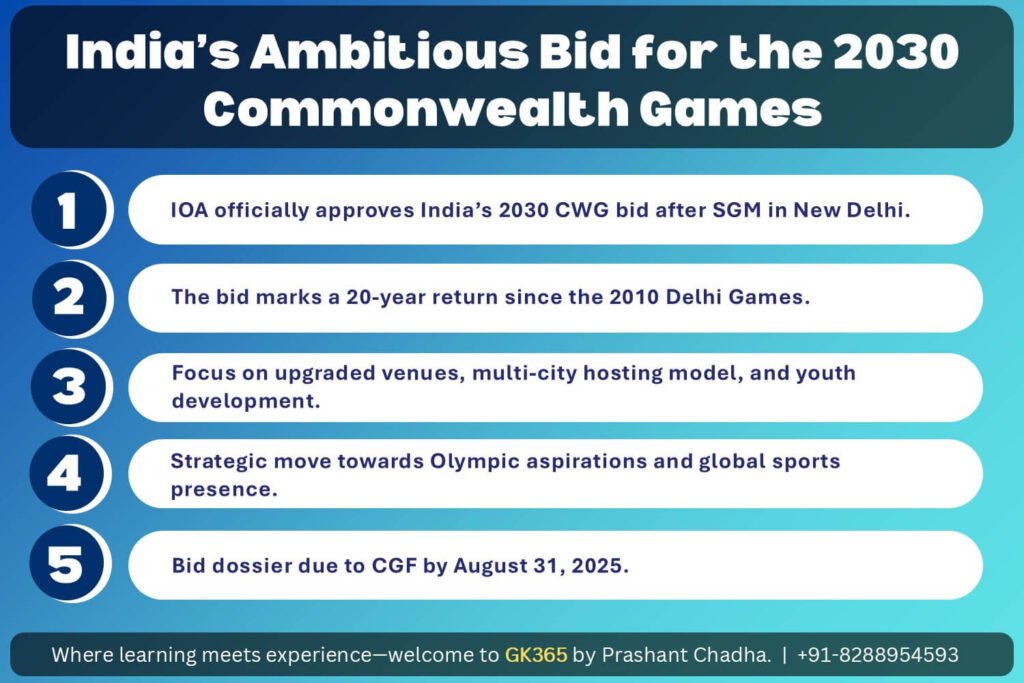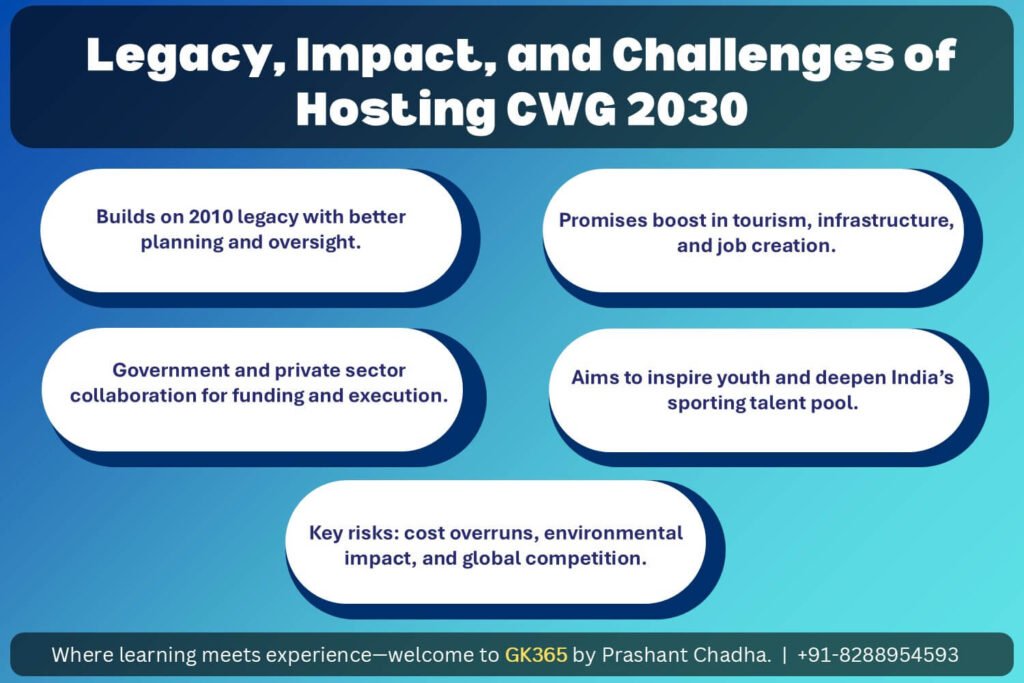Table of Contents
- Introduction
- Historical Context of India at the Commonwealth Games
- The 2010 New Delhi Games: Legacy and Lessons
- The Road to the 2030 Bid
- Strategic Importance of Hosting in 2030
- IOA’s Plan and Bid Process
- Infrastructure and Venue Considerations
- Government Support and Policy Backing
- Economic and Tourism Impact
- Sports Development and Youth Engagement
- International Sports Diplomacy
- Challenges and Potential Risks
- Global Competition for the 2030 Games
- Timeline and Next Steps
- Conclusion
- Key Takeaways Table
1. Introduction
The Indian Olympic Association (IOA) has approved India’s bid to host the 2030 Commonwealth Games. The decision came after a Special General Meeting in New Delhi. India must submit its proposal to the Commonwealth Games Federation (CGF) before 31 August 2025. If chosen, it will be the first time since 2010 that India hosts the event.

2. Historical Context of India at the Commonwealth Games
India has competed in the Games since 1934. Its athletes have performed strongly in shooting, wrestling, boxing, and weightlifting. The 2010 edition in New Delhi was India’s first time as host, placing it among a few countries to stage the competition.
3. The 2010 New Delhi Games: Legacy and Lessons
The 2010 Games brought over 4,300 athletes from 71 nations and territories. They improved city infrastructure, expanded sports facilities, and boosted India’s role in global sports administration. The event drew praise for sporting success but faced criticism for project delays and cost overruns. For 2030, planners aim to keep the benefits and avoid past lapses.
4. The Road to the 2030 Bid
The move to bid for 2030 follows years of talks between the IOA and government. The 2025 approval shows alignment between sports bodies, state governments, and central authorities. The CGF requires a bid dossier with venue plans, budgets, logistics, and proof of political and financial backing. India has just over a year to prepare it.
5. Strategic Importance of Hosting in 2030
The 2030 Games would mark 20 years since New Delhi 2010. Hosting fits into India’s plan to secure major global events, possibly including a future Olympic bid. The aim is to show India can deliver large events on time and to global standards.
6. IOA’s Plan and Bid Process
The IOA will prepare a detailed bid, covering:
- Host city and venue clusters
- Review of stadiums and new facility needs
- Transport and accommodation planning
- Security measures
- Financial models and cost guarantees
The plan will require close work with state and central governments and private partners.
7. Infrastructure and Venue Considerations
India must decide whether to hold events in one city or across multiple locations. While Delhi was the sole hub in 2010, improved connectivity may allow a multi-city approach. Upgrades are expected for athletics and aquatics stadiums, indoor arenas, athlete villages, and media facilities.
8. Government Support and Policy Backing
Central government backing is essential for funding, security, and logistics. In 2010, both central and Delhi governments provided large allocations. For 2030, a shared funding model is likely. CGF rules also require written guarantees from government bodies.
9. Economic and Tourism Impact
Major sports events can boost tourism and spending in hotels, transport, retail, and entertainment. The 2010 Games brought about 100,000 visitors to Delhi. With better air links and digital promotion, 2030 could attract more, especially if paired with cultural and heritage programs.
10. Sports Development and Youth Engagement
Hosting can inspire young athletes. In 2010, interest grew in athletics, boxing, and wrestling. For 2030, the IOA and Sports Authority of India plan to connect the event with long-term youth training and scholarship programs, aiming to build talent in track and field, gymnastics, and swimming.
11. International Sports Diplomacy
The Games offer a chance to strengthen ties with Commonwealth nations. They create opportunities for cultural exchange, bilateral sports cooperation, and a stronger leadership role for India in the Commonwealth. Such events can also attract sports investment and promote knowledge-sharing in event management.
12. Challenges and Potential Risks
The bid carries risks, including:
- Budget overruns
- Tight construction timelines
- Environmental impact
- Security demands
- Post-event use of facilities
Managing these will need early planning, transparent procurement, and independent oversight.
13. Global Competition for the 2030 Games
Canada, Australia, and Malaysia are possible rivals. All have strong sports infrastructure and hosting experience. India must highlight cost efficiency, strong legacy plans, and its large, youthful population.
14. Timeline and Next Steps
- August 2025: Bid submission to CGF
- Late 2025: Review and shortlist
- Early 2026: Final presentations
- Mid 2026: Host announcement
If selected, India will have four years to prepare, with early work on facilities and training programs key to success.

15. Conclusion
India’s 2030 Commonwealth Games bid reflects ambition and capability. The IOA’s approval begins a demanding process that will need cooperation between sports bodies, governments, and private partners. If the bid succeeds, the Games will influence infrastructure, tourism, and youth sports for years.
Key Takeaways Table
| Aspect | Details |
|---|---|
| Official Bid Approval | IOA confirmed India’s intent to bid at its Special General Meeting. |
| Historical Context | India has competed in CWG since 1934; hosted once in 2010. |
| 2030 Vision | Symbolic 20-year return; push towards Olympic-level hosting capability. |
| Infrastructure Strategy | Consideration of single vs. multi-city model; stadium and athlete village upgrades planned. |
| Government Involvement | Central and state governments expected to co-fund and back the bid. |
| Economic & Tourism Impact | Expected to boost travel, hotel, retail, and culture sectors with higher visitor numbers than 2010. |
| Youth & Sports Development | Events linked to long-term athlete training, grassroots programs, and scholarships. |
| Challenges | Budget risks, tight timelines, environmental concerns, and rival bids from Canada, Australia, Malaysia. |

